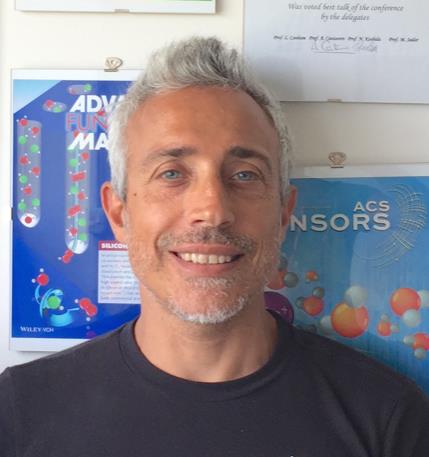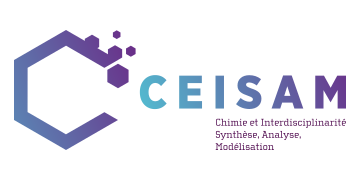Le Professeur Giuseppe Barillaro donnera une conférence le mercredi 31 janvier à 10h30 dans la Salle Marie Curie.
Son groupe de recherche à l’Université de Pise travaille sur les matériaux micro et nanostructurés pour des applications de (bio)détection et de nanomédecine, entre autres.
Il est actuellement le coordinateur d’un projet EIC Pathfinder Open sur les dispositifs et capteurs implantables et biodégradables pour les applications médicales (https://www.resorb-project.eu/).
Implantable and bioresorbable chemical sensors for in-vivo monitoring of clinical-
diagnostic markers
Giuseppe Barillaro
University of Pisa, Information Engineering Dpt, via G. Caruso 16, Pisa, Italy
giuseppe.barillaro@unipi.it
Imagine your doctor could slip a miniaturized sensing system under your skin and use it to
continuously monitor the concentration of almost any molecule in real-time as it circulates
through your peripheral blood. This would revolutionize many areas of diagnostics, enabling
individualized reports on both disease progression and drug efficacy to be achieved
continuously, in real-time. Imagine the sensing system implanted under your skin to
communicate with your mobile phone (wireless communication) to transfer the clinically
relevant data (biomarker or drug concentration) directly to your doctor. This would impact
the way we diagnose diseases and monitor drug efficacy, currently based on single-moment-
in-time tests, enabling personal, timely, and effective medical feedback (real-time
personalized medicine). Finally, imagine the biochemical sensor in your body is resorbed upon
a click, once you don’t need it anymore. This would eliminate any need for sensor retrieval,
avoiding risks connected to surgery and providing a risk-free “red button” to destroy it, in
case issues will occur (e.g., end of the therapeutic process, inflammation, malfunctioning).
In this lecture, cutting-edge research on the use of biodegradable and bioresorbable
nanostructured materials for the development of implantable bioresorbable sensors for the
tracking of analytes of clinical interest (e.g., drugs, biomarkers, ions) in-vivo, in-situ, and in
real time that completely dissolve with biologically benign by-products after use will be will
reviewed and discussed.
The proposed sensing technology is environmental-friendly and waste free and a number of
ex-vivo applications for the monitoring of analytes in biofluids, water, ground are also
envisaged.
References
[1] E. Mazzotta, T. Di Giulio, S. Mariani, M. Corsi, C. Malitesta, and G. Barillaro, Vapor‐Phase Synthesis of
Molecularly Imprinted Polymers on Nanostructured Materials at Room‐Temperature, Small, 2302274 (2023)
[2] A. Paghi, M. Corsi, A. A. La Mattina, G. Egri, L. Dä hne, and G. Barillaro, Wireless and Flexible Optoelectronic
System for In-Situ Monitoring of Vaginal pH Using a Bioresorbable Fluorescence Sensor, Advanced Materials
Technologies, 2201600 (2023). DOI: 10.1002/admt.202201600
[3] M. Corsi, A. Paghi, S. Mariani, G. Golinelli, A. Debrassi, G. Egri, G. Leo, E. Vandini, A. Vilella, L. Dähne, D.
Giuliani, and G. Barillaro, Bioresorbable Nanostructured Chemical Sensor for Monitoring of pH Level In Vivo,
Advanced Science, 2202062 (2022). DOI: 10.1002/advs.202202062
[4] A. A. La Mattina, S. Mariani, G. Barillaro, Bioresorbable Materials on the Rise: From Electronic Components
and Physical Sensors to In Vivo Monitoring Systems, Advanced Science, 1902872 (2020). DOI:
10.1002/advs.201902872
[5] S. Mariani, V. Robbiano, L. M. Strambini, A. Debrassi, G. Egri, L. Dähne, G. Barillaro, Layer-by-layer
biofunctionalization of nanostructured porous silicon for high-sensitivity and high-selectivity label-free affinity
biosensing, Nature Communications, 9, 5256, 1-13 (2018). DOI: 10.1038/s41467-018-07723-8

First name: Giuseppe
E-mail: giuseppe.barillaro@unipi.it
Institute/affiliation: University of Pisa
Biosketch
Giuseppe Barillaro is Full Professor at the Information Engineering Department of the
University of Pisa.
Research at Barillaro’s group is focused on the preparation of materials, structures, and
systems at the micro and nanoscale with applications in the fields of (nano)photonics,
microelectronics, (bio)sensing, and (nano)medicine.
G. Barillaro is author of more than 120 papers in peer-reviewed international journals and
holds over 20 patents. He has led more than 30 research expenditures, at international and
national levels, on micro and nanostructured materials and platforms for (bio)sensing and
(nano)medicine.
Since 2022 he is the PI of “RESORB” (https://www.resorb-project.eu) an EIC Pathfinder Open
project funded by the EC with 3 M€ for the development of implanted bioresorbable sensor
systems for tracking biomarkers and drugs in vivo.
Informations : Arnaud TESSIER

